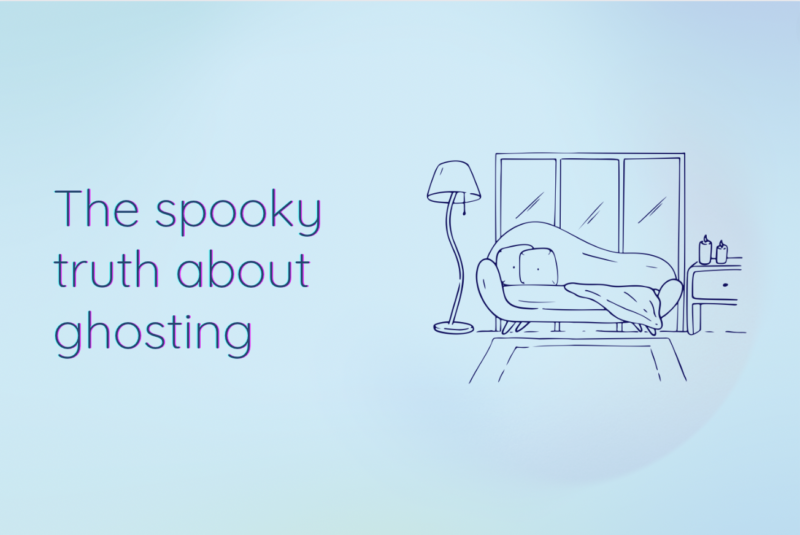The Spooky Truth about Ghosting
Andres Carrion | July 2023
With technology becoming such an integral part of communication, socializing, and dating, ghosting has unfortunately also become common. Though scary, ghosting in this sense does not refer to phantoms, spirits, or halloween. Ghosting refers to the act of abruptly ending all communication with another person with little to no explanation. The person completely vanishes from one’s life, almost as if they were a ghost. This typically occurs in the context of dating, but ghosting can also occur in a variety of contexts, social settings, and relationships. Because ghosting is so common, chances are that you or someone you know may have either experienced ghosting or have ghosted someone.
There are three forms of ghosting: abrupt, haunting, and slow burn. An abrupt ghoster is someone who can be merciless and may completely disappear on someone with no warning.
This might look like blocking someone across different platforms, or simply just ignoring their message until they stop. Haunting, or lurking, refers to a ghoster who may not respond to your messages but continues to view your stories or even like your posts. This type of ghosting can be especially confusing as one may question whether the person is interested if they are still interacting with them to some extent. This is different from breadcrumbing which is when a person deliberately leads someone else on with morsels of affection. Finally, there is the slow burner.
This type of ghoster is someone who slowly ends communication with someone. They may have started off really strong but at some point interest dwindled and so did the motivation to continue communication. With this type of ghosting, you may have thought the person liked you, and you may have even begun to develop feelings for them. You may notice signs of disinterest by shorter or slower responses or even a shift in tone. There may be an increased anxiety around this type of ghosting because we can sense an end coming and there may be a development of feelings. Regardless of how they do it, getting ghosted hurts and can be very frustrating.
There is no one specific reason why people ghost others, but it almost always has more to do with the ghoster than the person being ghosted. People typically ghost because they have low emotional intelligence, have an aversion to conflict, have attachment anxiety, and/or have people pleasing tendencies. If someone is disinterested in pursuing a relationship with another person, they might resort to ghosting because they feel anxious telling the person directly that they don’t want to continue a relationship with them.
When we get ghosted, we may feel sad, anxious, rejected, and angry. We might even negatively view ourselves and our other relationships. Additionally, we may drive ourselves down thought spirals wondering why they would ghost us or what we can do to fix things. The truth is, we cannot make anyone do anything, including ghosting us. It also is not our responsibility to figure out why someone would ghost us. Our responsibility is to decide how we will move on.
Find the Best Therapist in Chicago to Cope Ghosting
When we get ghosted, it can be very painful depending on the relationship. Regardless of who ghosted us, it is important that we focus on our own healing. Do not focus on the intent behind the ghosting and focus on how it impacted you. Challenge any thoughts that may be triggering any core beliefs. Practice self-care and spend time with loved ones. Bring it up with your therapist and process your emotions. Finally, remember that this has more to do with the other person than it does with you.
At Roamers Therapy, our psychotherapists are here to support you through anxiety, depression, trauma and relationship issues, race-ethnicity issues, LGBTQIA+ issues, ADHD, Autism, or any challenges you encounter. Our psychotherapists are trained in Cognitive Behavioral Therapy, Dialectical Behavioral Therapy, Psychodynamic Therapy, Acceptance, and Commitment Therapy, Person-Centered Therapy, and Gottman Therapy.
Whether you’re seeking guidance on a specific issue or need help navigating difficult emotions, we’re ready to assist you every step of the way.
Contact us today to learn more about our services and schedule a session with our mental health professionals to begin your healing journey. To get started with therapy, visit our booking page.
First, decide if you’ll be paying out-of-pocket or using insurance. If you’re a self-pay client, you can book directly through the “Book Now” page or fill out the “Self-Pay/Out-of-network Inquiry Form.” If you’re using insurance, fill out the “Insurance Verification Form” to receive details about your costs and availability. Please let us know your preferred therapist. If your preferred therapist isn’t available, you can join the waitlist by emailing us. Once your appointment is confirmed, you’ll receive intake documents to complete before your first session.
This page is also part of the Roamers Therapy Glossary; a collection of mental-health related definitions that are written by our therapists.
While our offices are currently located at the South Loop neighborhood of Downtown Chicago and Lakeview on Chicago’s North Side, Illinois, we also welcome and serve clients for online therapy from anywhere in Illinois and Washington, D.C. Clients from the Chicagoland area may choose in-office or online therapy and usually commute from surrounding areas such as River North, West Loop, Gold Coast, Old Town, Lincoln Park, Rogers Park, Logan Square, Pilsen, Bridgeport, Little Village, Bronzeville, South Shore, Hyde Park, Back of the Yards, Wicker Park, Bucktown and many more. You can visit our contact page to access detailed information on our office location.

